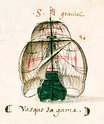


Notice: This is the official website of the All Empires History Community (Reg. 10 Feb 2002)
Studnicki (2002) Early modern Portuguese networks |
Post Reply 
|
| Author | |
Maharbbal 
Sultan 

Retired AE Moderator Joined: 08-Mar-2006 Location: Paris Online Status: Offline Posts: 2120 |
 Quote Quote  Reply Reply
 Topic: Studnicki (2002) Early modern Portuguese networks Topic: Studnicki (2002) Early modern Portuguese networksPosted: 04-Apr-2008 at 02:22 |
This entry is also available on my blogStudnicki-Gizbert Daviken (2002) ôInterdependence and the collective pursuit of profits: Portuguese commercial networks in the early modern Atlanticö, Curto Diogo Ramada and Molho Anthony eds., European University Institute Working Paper, 2, Commercial Networks in the Early Modern World, 90-120.
This article is available on line (pdf). Introduction The Portuguese merchant network or nation was one of the ômost dynamic institutions of transnational and inter-regional trade of the early modern periodö (91). A nation was a community of foreign merchants distinguished from the local society and institutionally and/or socially bond together. An ad hoc organisation The Portuguese nation was geographically dispersed over the Atlantic world yet socially socially connected during the 16th and earlt 17th century. It hosted an ôecologyö of relationships (kinship, commercial association, common religion). It fostered trust which allowed market transactions in the absence of ôinstitutionalized enforcement mechanismsö (92). This type of organisation proved particularly useful for illegal inter-imperial trade (43% of Spanish American silver import were smuggled out of the monarchical monopoly system) (93). At the beginning of the 17th century, there were about 9,000 merchants in the Portuguese network (only half of them were born in Portugal). They highly mobile and could resettle 5 times over the course of their lives. The network was also extremely fluid with new houses entering regularly and old ones disappearing often (95). An elusive bond The Portuguese nation was an heterogeneous networks that did not rely chiefly on a priori bonds such as religion, nationality, kinship or common origin:
The Portuguese nationĺs bonds were to be constructed, they were not inherited. Common values Early modern values of mutualism and interdependence (rather than contemporary individualism) were at the core of the Portuguese merchantsĺ mentalities (100). ôMembership made the manö (101). Merchants considered they were ôinvestedö in one another. Self-interest was to keep the group united and wealthy. Individualism was broadly seen as a dangerous and sinful trait. As a result, oneĺs good reputation was essential. Numerous and dense linkage between the merchants allowed information to travel and oneĺs status was constantly updated. A very social life style (large household, frequents celebrations, etc.) made secrecy difficult (102). ôThe Atlantic-wide constellation of merchant houses was like a neighbourhood abuzz with gossipö. It was essential to keep bonds alive and meaningful and exchange judgement and evaluation. The gossip network Talk and active gossip built and undermined reputations. One had to remain reputable and honorable and keep his partnersĺ and parentsĺ good name untarnished (103). This stream of information also expressed the groupĺs normative values. Honesty was critical at a time when huge sums were lent with no enforcement mechanisms to guarantee the recovering of debts (104). Frankness was also important as it the social cohesion of the trading houses. So was largesse (105). Humility and deference was essential to sociability (one was always at his associateĺs service) (106). Creating new links Gift-giving was often use to materialise the merchantsĺ interdependence. A wide variety of gift travelled across the Atlantic. They smoothened merchant to merchant relationships as well as extending oneĺs network beyond the circles of merchants. Indeed, the Portuguese nation around the Atlantic was also composed of mariners, civil servants, clergymen and artisans. The Portuguese communities connected in chapels and hospitals . Merchants were the benefactors of their communities, for instance providing dowries to orphans girls (108). In return, merchants were often elected consuls of the communities (109). The exchange of gifts also thickened the relationship between merchants that often evolved into a form of brotherhood which could be institutionalised through compadrazgo (godparentage) and marriage. Kinship was constructed, not a given. This marital strategy created connections so dense that it is often difficult to distinguish one family from another. Merchants spent heavily on their daughtersĺ dowry. A sound investment that extended oneĺs network (112). The powerful merchants were regarded as the patrons or the fathers of their communities, a speaking image for a paternalistic society where family was a central institution. A powerful merchants would have under his authority his descendents, his slaves and his clients, like a roman dominus (114). The commercial network Unlike joint-stock companies, the Portuguese network had a decentralized system of monitoring. The network was a highly integrated structure in turns every one has each otherĺs associate, debtor and creditor. As such the individual merchantsĺ caudal (both moral quality and economic capital) was key to the whole organisation. A good example of interdependence is to be found in the fact that young merchants needed their seniorsĺ loans of stock and capital to start off and that the latters needed their juniors to develop their network and each new markets (115). Long-standing associations were the norm and they sometimes extended over generations. These multi-layered relationships were essential and one was careful not to sever them. With trust came flexibility as merchants could empower their associate to manage their business on the other side of the ocean (116). The fact that between two partners, the account was always imbalanced (one owned something to the other one year, and inversely the following year), this made lasting commercial relationships almost a necessity. References
|
|
|
I am a free donkey!
|
|
 |
|
Post Reply 
|
| Forum Jump | Forum Permissions  You cannot post new topics in this forum You cannot reply to topics in this forum You cannot delete your posts in this forum You cannot edit your posts in this forum You cannot create polls in this forum You cannot vote in polls in this forum |
Copyright ©2001-2009 Web Wiz
This page was generated in 0.062 seconds.











 Printable Version
Printable Version Google
Google Delicious
Delicious Digg
Digg StumbleUpon
StumbleUpon Windows Live
Windows Live Yahoo Bookmarks
Yahoo Bookmarks reddit
reddit Facebook
Facebook MySpace
MySpace Newsvine
Newsvine Furl
Furl Topic Options
Topic Options

